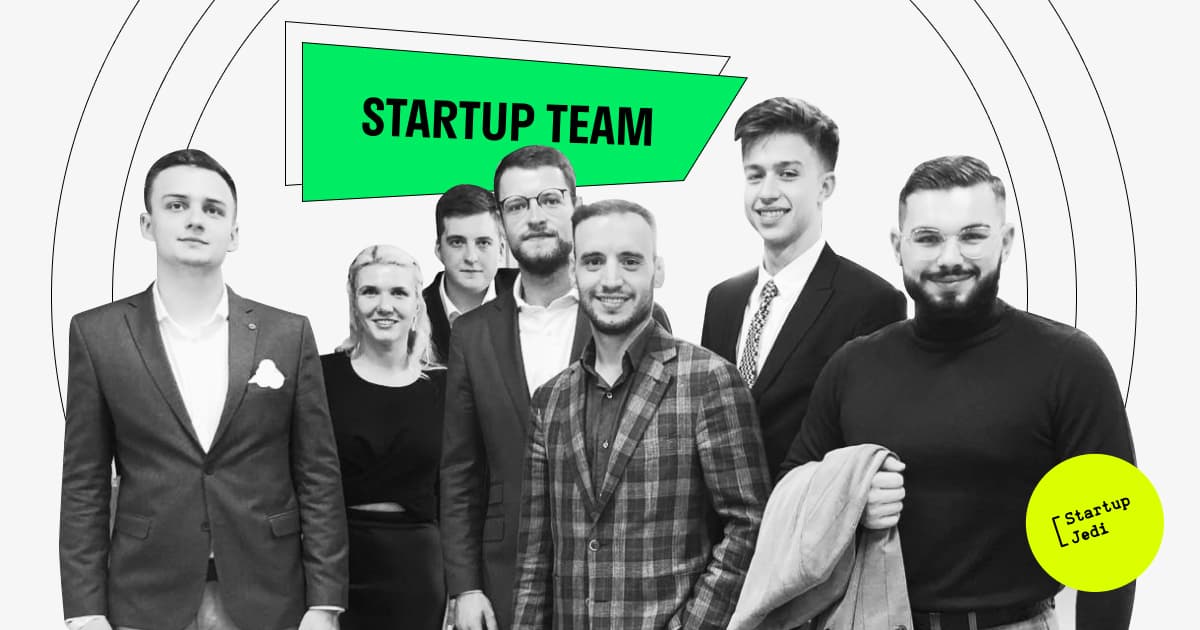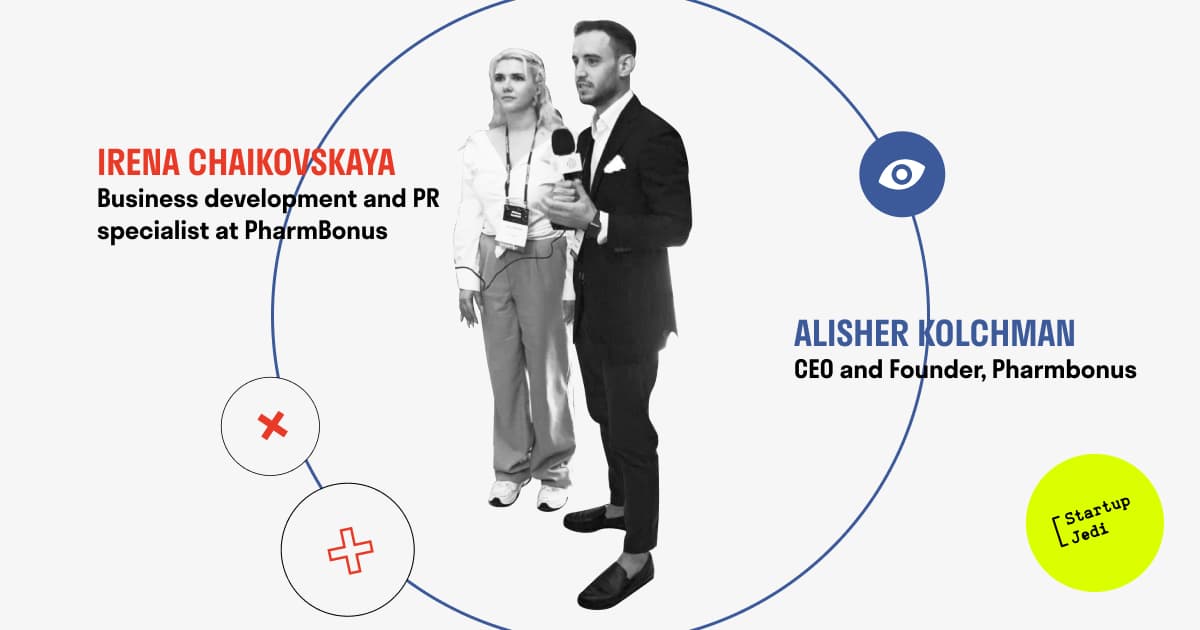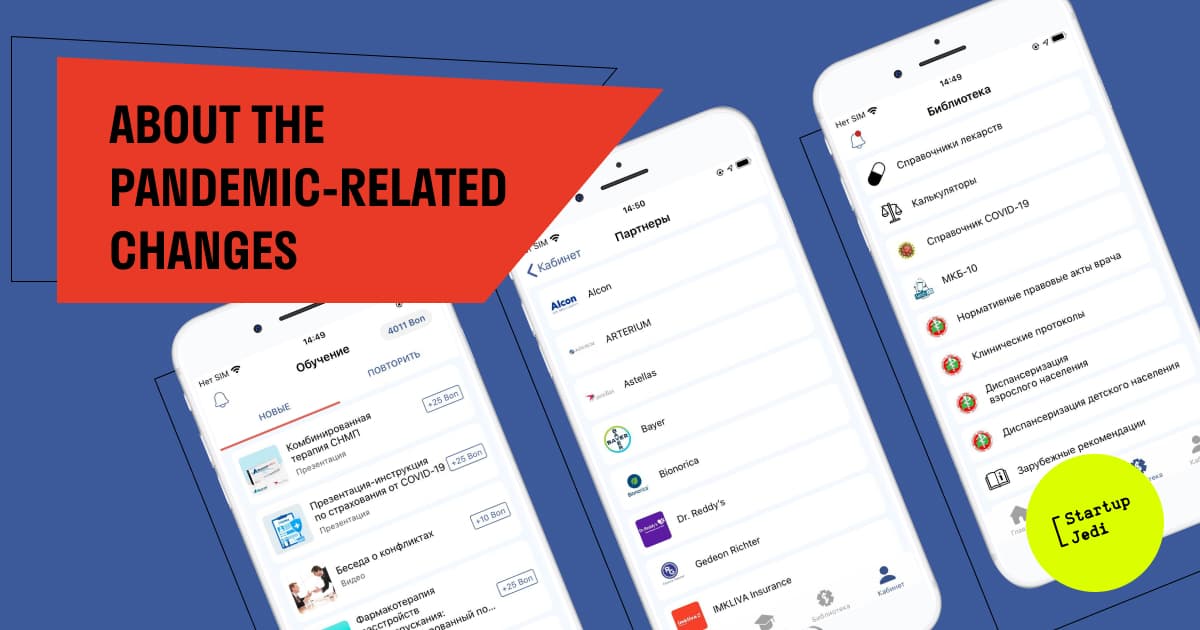
Startup Jedi
We talk to startups and investors, you get the value.
In 2016, pharmacist Alisher Kolchman launched the PharmBonus app for doctors and pharmacy workers. And he was told that they do not have money for a smartphone to use it ... But the project survived, is developing and is preparing to enter new markets.
What helped to enter the conservative and non-digitized market? How is a medical startup doing during the pandemic? Alisher Kolchman, CEO, and Irena Chaikovskaya, business development and external relations specialist at PharmBonus LLC talked about this in our interview.

Startup Jedi
We talk to startups and investors, you get the value.
PharmBonus is a superapp (application with many modules) for doctors and pharmacists. It has news and training information for healthcare providers, current events guide, vacancies and more. The project makes money using an advertising-integration model: not only advertises for pharmaceutical companies, but also produces them.
A test version of PharmBonus appeared in 2016. Today the application has over 16 thousand users. Project partners include BAYER, NESTLE, NOVARTIS, ASTELLAS, GEDEON RICHTER, KRKA, INVITRO and others.
...

— Let’s take a quick excursion into the history of the application. Today it has over 10 modules. And what was in the very first version?
Alisher: We understood from day 1 that information is the basis of our service. So the news feed module was the first. We prepared unique content ourselves that was only partially provided by customers (for example, news about the release of drugs). There was a training module that included presentations with tests on products, treatment methods, prescriptions. Then came BonMarket (a bonus program), vacancies, current events guide, a library (medical reference books and calculators). Over three years, not a single module has been removed, we still need all of them. I created this platform as if it was for myself, asking myself what I would use as a pharmacist.
Of course, we have added more modules over the years. We’ve recently created a COVID-19 guide, added the ability to send messages from app users (doctors and pharmacists) to drug manufacturers about adverse reactions and side effects.
The information in the application is targeted: the specialist doctor receives the content that is relevant to them in the application.
— At the end of October 2020, TUT.BY published the news about the launch of your application with the COVID-19 insurance function. Is this a new app or an addition to the existing one?
Alisher: This is an option in our application, part of our bonus program, and not a new project. The user (and we have only verified doctors and pharmacists) accumulates points and can exchange them for bonuses, including free insurance from our partner.
— Such a service would certainly be in demand not only among doctors. Why not create an add-on module / application for insurance for a wide audience?
Alisher: This is one of the frequent questions we keep receiving after publishing the material :) We received a barrage of questions and even negative comments from medical personnel with secondary specialized education, who would also like to take advantage of this opportunity.
But the application is available only for doctors (higher medical education) and pharmacy workers (pharmacists / pharmacists). We are not planning to introduce mass insurance for people. We understand that nurses and even medical students are at high risk and we are working on a version of the application for them. Restrictions on access to the application are primarily due to the legislation of Belarus on access to specialized information on medicines. But we have found a solution and we will open access to this audience as well in the first quarter of 2021.
It should be noted separately that it was not so easy to implement the insurance option. As you can imagine, our audience is one of those with the highest risk of the disease. Now the majority of Minsk hospitals are already “dirty” (that is, they have “covid” departments). Each insurance is an average of 50 rubles, which is covered by our partner, the Hungarian pharmaceutical company Gedeon Richter.
— How many users have already taken advantage of the insurance?
Irena: Over 1000.
...

— Several years ago, your project was on the verge of bankruptcy …
Alisher: Yes, we went through hard times. Every now and then they asked me: “Are you still alive?” … The customers did not want to listen to us. Some argued that they needed a separate employee to work with us. They looked at us like cosmonauts: “Why use an application if you can go to sites and get information?”. We’ve also heard arguments that pharmacy employees or doctors do not have enough salaries to buy a smartphone (although even in 2016 it seemed strange), which means they will not be able to use our application.
For about six months I was in the office with just a programmer or two. All my own resources (over $ 100,000) had been spent, the programmers only stayed since they believed what I promised. Some of the employees came to the project as students, got symbolic salaries, and we were surviving on pure enthusiasm together. Today these are full-fledged, strong employees who have grown into entire departments: medical and pharmaceutical departments with bosses and subordinates, development and marketing departments, production, sales, customer service and others.
— It turns out that it is sometimes useful for a young project to hire students?
Alisher: There is a wonderful word in English, must. So, students, and sometimes even students of the last grades of school are a must. It is absolutely necessary to pay attention to students, to look for people not only with a head, but also with character: tenacity, enthusiasm, the ability to learn.
— What else helped you get out of the crisis?
Alisher: Many external reasons and my persistence. I continued to work, fantasize, look for a team (not always experienced, but reliable personnel). I myself went to pharmacies with invitations, made rounds as a representative and talked about the application. Time will tell.
The Belarusian market has become more digitized, the price of smartphones has dropped significantly. By the way, we are often asked — will there be a desktop version? Not any time soon. We didn’t even develop a version for tablets, because they are not so popular anymore. Smartphone screens have increased, there is no need to carry a bunch of devices with you.
For some companies, we were the first who they signed documents with for digital promotion. Today they allocate a separate expense item for us. Our time has come. We can say that our project was born before the digitalization of the pharmaceutical market began.
...

— What has changed in your company with the onset of the pandemic?
Irena: COVID-19 has boosted our development. Usage conversion (number of registrations and daily use of the application) has increased by at least 5 times. Pharmaceutical companies have shaken up, too. Previously, their representatives visited doctors to present their products, but now they needed to access the audience remotely.
We also became a platform where you can implement online lectures, conferences, round tables, recorded over 100 lectures and even opened a studio and hired an operator.
In six months, we doubled to 30 people: we hired content managers, developers, operator and editor, technical specialists and salespeople. And we are still looking for specialists. We need a SEO and an SMM specialist.
— How much revenue growth have you seen this year?
Irena: Revenue increased by 130% over last year.
— What is your revenue made up of?
Alisher: 30% is production (advertising materials, design, video content), the rest is advertising integration. We also have an analytics service that brings in about 5% of revenue. These are annual questionnaires that help us collect the opinion of experts on the choice of medicines, treatment of diseases, the choice of brands of medical equipment.
— How do you track KPIs for your advertisers? What does an advertiser generally require as a KPI?
Alisher: Of course, all advertisers are interested in sales, but measuring them is quite difficult. Our specificity lies in the instant delivery of information to the audience, which we perfectly cope with. We measure the number of clicks, the success of the passed tests, all other responses in the application. But the personal data of our users is our shrine, and we do not disclose it to third parties. An exception is the response to vacancies where it is necessary to send a resume to the employer.
— How do you check the reputation of advertisers?
Alisher: We only work with certified and international corporations. We had to refuse cooperation with the companies whose reputation we do not trust.
— Conferences were one of the most effective ways to promote you. But this year they are probably canceled. Where did you send your marketing budget?
Alisher: The absence of specialized conferences did not hinder us much. Such conferences are a costly affair, where participation costs about € 10,000. For us, it was more of an image story. In their absence, we improved the quality of the technical part of the application and the content in it, as well as our referral programs: for example, simplified registration, corrected UX / UI, added QR codes for the referral system and automated part of the user verification process.
— Alisher, you have a pharmaceutical education, so it is especially interesting to know your opinion on the pandemic.
Alisher: I will answer as a person who’s getting back from sick leave today. I was ill for more than two weeks, of which I spent a week in the hospital with pneumonia. We have been with this virus for a long time, and we need to take it seriously. Unfortunately, the attitude towards the virus in our country is sad. Nobody talks about lockdown, it is economically exorbitant for Belarus, but nightclubs continue to work in our country, concerts are held, practically no one controls people in quarantine …
— Are you going to get vaccinated against the coronavirus?
Alisher: The virus is still poorly understood, we are at the initial stage of understanding it and do not know how to deal with it. I’ll put it that way: I refused most of the drugs in the hospital. This was my personal decision, but it is based on international guidelines. Antibiotic therapy is often given in hospitals, but it is often not needed. There are medicines that other countries have already refused that are still prescribed in Belarus. Apparently, they have already been bought and you need to use them.
...

— What are the pros and cons for an entrepreneur who chooses between a super app and an app with fewer features? What is more profitable and easier?
Alisher: Superapp is indeed a very difficult concept to implement. Each module is a separate application with its own specifics and functionality. And these modules should be concisely linked together.
— What’s the benefit then?
Alisher: And what is the basis of our business? The number of users. The more users, the more demand for the application, the more content, the more expensive it is for the customer. What caused the base growth? Interest in the project.
Let’s say we are making an application with jobs only. The user finds the required job and deletes the application. The more modules, the larger the audience you cover, the more advertising integrations from customers.
Irena: Using the terms “pill” and “vitamin” it’s easier for a superapp to become a pill — a global solution for more users.
...

— Is now the best time for medical startups?
Alisher: Yes! Medtech startups are very popular with investors, and many industry accelerators are opening, especially in Europe. For example, the top ones in Europe are Bayer’s G4A “Grants4Apps” (Germany), DigitalHealth.London (UK), Rockstart Health (Netherlands), Baselaunch (Switzerland), Open Accelerator (Italy). Many are created under the auspices of the Ministries of Health or Science Parks.
Medtech is leading at many summits, and so is digital medicine. Thus, 25% of patients at Wolves Summit in Warsaw that we took part in are in medtech and healthcare,and the winner of the pitch competition is a medtech startup. We also take part in Seedstars competition — a Swiss event for startups from around the world. In our region, 5 projects reached the final, 4 of them are from healthcare.
— The pandemic has shown that the world lacks simple solutions: enough masks, CT equipment, and so on. Do you think it is worth a startup today to develop some “off the charts” medical innovations, or is it better to launch something simple?
Irena: We do need simple solutions, but global developments cannot be canceled. Due to the pandemic, the focus of many projects has shifted, but this will pass. Large companies mostly buy or invest in startups that offer new, innovative solutions.
— A medical project usually needs medical professionals on staff. How many do you have?
Alisher: Out of 30 people in our team, only seven have no medical education. Our project seems to give birth to new professions: doctor-marketer, pharmacist-content manager. Even our programmers already understand, at least, the names of drugs.
— Are there any difficulties in hiring specialists with medical education? If so, what are they?
Alisher: Yes there is. There are not many doctors in Belarus who want to go into digital with their heads. They do not want to quit their practice, and it is very difficult to combine the work of a doctor with part-time jobs. In addition, many qualified professionals leave the country, especially after the August events. We have employees who have emigrated and work with us remotely.
— Your employees have experience in medicine, but do they have experience in a commercial project? What competencies are they lacking and how do you address the skill gap?
Alisher: We train our employees regularly, pay for courses: language, digital marketing, SMM, personnel management, corporate ethics, design, programming and more.
If an employee feels a lack of knowledge, or is craving to try themselves in a new profession, we agree on a budget and choose online courses for them. No request has yet been denied. Moreover, often I myself encourage employees to study.
— Startups in the field of medicine are often created by people who have nothing to do with medicine. What does an entrepreneur who wants to enter this field need to know?
Alisher: I’ll say a very simple thing that I have to mention: medicine is one of the areas with the biggest responsibility. You cannot be a bad doctor. Even we are at risk with our project, publishing recommendations on the use of drugs. When you come to a medical startup, you must understand the full responsibility for your actions. Like doctors, you have no room for error.
By the way, if we other medical tech startups notice us, we are open to collaborations.
...
— Are you thinking of raising investment now?
Alisher: Yes, we are. We plan to enter foreign markets in 2021: Poland, Ukraine, United Arab Emirates. Getting started quickly requires investment. We hope to close the round early next year.
Irena: We are opening the first office in Poland and are going to raise from € 200,000 to € 500,000 to do so. Due to the interest from Western partners, the development of our application on the Russian market has become less of a priority for us.
Facebook: facebook.com/StartupJedi/
Telegram: t.me/Startup_Jedi
Twitter: twitter.com/startup_jedi
Comments